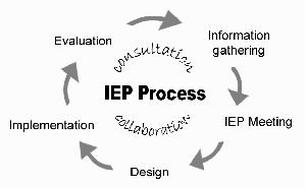“True Education is not achieved by parents and teachers alone”. Anonymous
Working With Parents
It is vital to understand while the inclusion and education of their child is important to a parent, the emotional and physical wellbeing of their child is their first concern. The relationship that teachers build with parents and caregivers of autistic children will provide mutual respect and trust, further enhancing a teachers ability to meet their childs educational and social needs.
The parent/teacher relationship can provide many insights into the childs behaviours allowing the transition from home to school easier, for example, a child having toilet accidents at school but not at home. If the child has a set routine for this activity, the parent can walk a teacher through this so that the same routine is adopted at school as well as at home. Consistency is the key to creating a safe platform for an autistic child.
IEP (Individual Education Plan)
Parents should be considered an important part of any educational strategies and have input into the IEP.
Class teachers keep records of curriculum planning for all students in the class. An IEP is a tool that may be used to document planning for specific individual educational needs arising from a disability. (DET, 2006)
Following a qualification process done by para professionals, the teacher, parents and other professional bodies meet. Using the results of observations and evaluation of the student the IEP is developed as a guide to future education goals. This plan will need to be reviewed every 6 months to identify strategies that aren't working and initiate new ones. This is vital as the consequence of continuing an ineffective IEP could result in a child underachieving.
It is vital to understand while the inclusion and education of their child is important to a parent, the emotional and physical wellbeing of their child is their first concern. The relationship that teachers build with parents and caregivers of autistic children will provide mutual respect and trust, further enhancing a teachers ability to meet their childs educational and social needs.
The parent/teacher relationship can provide many insights into the childs behaviours allowing the transition from home to school easier, for example, a child having toilet accidents at school but not at home. If the child has a set routine for this activity, the parent can walk a teacher through this so that the same routine is adopted at school as well as at home. Consistency is the key to creating a safe platform for an autistic child.
IEP (Individual Education Plan)
Parents should be considered an important part of any educational strategies and have input into the IEP.
Class teachers keep records of curriculum planning for all students in the class. An IEP is a tool that may be used to document planning for specific individual educational needs arising from a disability. (DET, 2006)
Following a qualification process done by para professionals, the teacher, parents and other professional bodies meet. Using the results of observations and evaluation of the student the IEP is developed as a guide to future education goals. This plan will need to be reviewed every 6 months to identify strategies that aren't working and initiate new ones. This is vital as the consequence of continuing an ineffective IEP could result in a child underachieving.
Ongoing Strategies for Working WITH Parents
- Consistent communication (Weekly progress reports or daily notes highlighting positive achievements)
- Advanced warning of changes where possible, if an unforeseen event occurs ie. fire drill, a phone call to advise parents of the event will be appreciated so they can handle any distress when their child gets home
- Teachers should encourage a 'buddy system' for autistic students where possible, this will encourage social interaction amongst families of classmates

